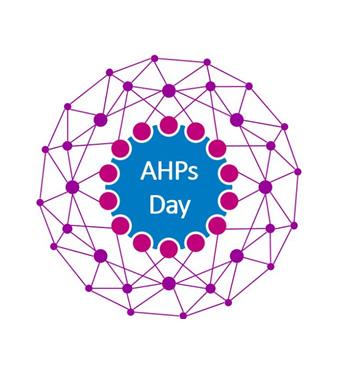
We've been in touch with colleagues representing the majority of the 14 Allied Health Professions to find out more about their roles and how they may have had to adapt this year.
The Allied Health Professions (AHPs) are the third largest workforce in the NHS. Through adopting an holistic approach to healthcare, AHPs are able to help manage patients’ care throughout the life course from birth to palliative care.
Their focus is on prevention and improvement of health and wellbeing to maximise the potential for individuals to live full and active lives within their family circles, social networks, education/training and the workplace.
(Source: nhs.uk)
To find out about more about the AHPs working at NBT and in partnership with us, read the profiles below.
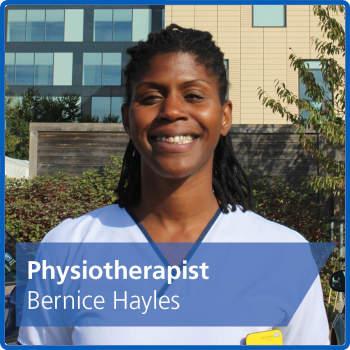
Describe your role
I am a physiotherapist specialising in neurosciences. I provide acute assessment and rehabilitation for a wide range of conditions, including brain and spinal injuries. I have a special interest in spinal cord injuries and neuro-oncology.
Why or how did you get into your role?
I was inspired to train as a physiotherapist by the therapists who treated my grandma following a stroke, so I have always had an interest in neurosciences. I have volunteered in spinal rehab centres in Haiti and Nepal.
How has the pandemic impacted on you or your role?
As a clinical lead I have had to look at new ways of working under the new COVID guidelines. This included different working patterns, working ‘bubbles’ and the development of a neurosciences admissions avoidance hot clinic in ED. Personally I have become more emotionally resilient and learnt new strategies to support myself and my colleagues during these uncertain times.
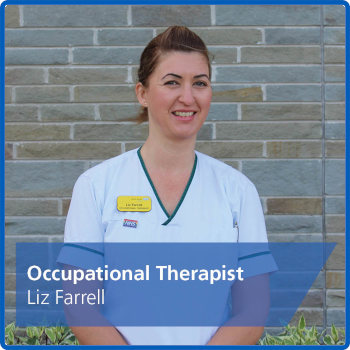
Describe your role
I’m an Occupational Therapist working in Elective Orthopaedics. I work with the team on the wards making sure that patients are safe to be discharged home after their surgery to carry out their everyday activities e.g. getting washed and dressed, getting in and out of bed, making meals etc. Along with this I help to educate patients about the procedure they are having – both at a pre-op and post –op stage. I also signpost/refer patients on to other services to help support them post discharge.
Why or how did you get into your role?
I knew I wanted to do something vaguely “medical” but wasn’t sure what. As a teenager I attended a talk by an OT at a Guides meeting and I was very interested in all the pieces of equipment and wheelchairs etc! After doing some work experience I decided to go into OT. I got a degree in OT and have been working in OT since. I have done lots of different OT roles and worked in the community and in hospitals. My favourite area of work is Elective Orthopeadics where I work at present.
How has the pandemic impacted on you or your role?
Elective Surgeries were cancelled to start with which meant I helped out for a while seeing medical or trauma patients. Then I was advised not to be patient facing due to my asthma, so I worked in the ICB Hub. This involved liaison between the hospital therapists/Case managers and community teams to try to enable patients to be discharged as soon as medically fit. This was a different use of my OT skills, but still enjoyable. I became very good at filling in SRFs!
I am now cleared to work on the wards again and I am working on the “Green” wards seeing patients who have had elective orthopaedic surgery or other elective surgical procedures. So I am learning about another area of OT again. As a team we have adapted our working practices over the course of the pandemic e.g. We are not able to run our Pre-op education groups at present so most of our pre-op assessments and intervention is done over the phone. We are looking into ways some of our O.T pre-op education could be done virtually via the internet.
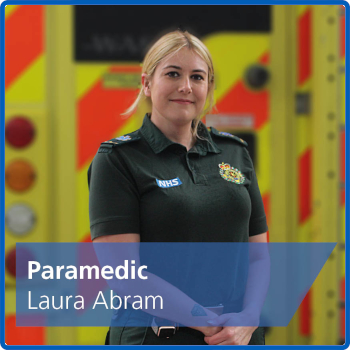
Describe your role
I love my role as a paramedic because no two days are the same. In a shift, we could do anything from delivering a baby, attending major trauma incidents and heart attacks, to helping an elderly person who has fallen and requires assistance with their social needs. The range of alternative care pathways and skills available to us has broadened greatly over the years, meaning that, whilst you may need to be conveyed to hospital for further treatment, it may be possible for us to treat you at home with follow up from other healthcare providers.
Why or how did you get into your role?
I joined the ambulance service after previously working in Microbiology. I wanted a more patient centred role and so decided a career in green was the one for me. Starting on the non-urgent patient transport service in 2007, I then took myself to UWE to study for a degree in Paramedic Science. I’ve now been qualified 8 years and spend my shifts either with my crew mate on a double crewed ambulance, or as a lone responder on a rapid response vehicle.
How has the pandemic impacted on you or your role?
The role changed massively for us all in 2020. We’ve all had to adapt and adjust to a new and ever changing way of working. I have been concerned to hear that there has been a rise in assaults against ambulance staff and other emergency workers. My message to the public would be to continue to follow the relevant guidelines, and if you do need us, keep us safe so we can help you and get home to our families at the end of our shift.
After time off work having contracted COVID myself, I was able to safely return to work in early April. In amongst the increased PPE, new guidelines, ever increasing challenges and uncertainty, we’ve been well supported and we continue to look after each other. It’s one big green family, and I’m proud to be part of it.
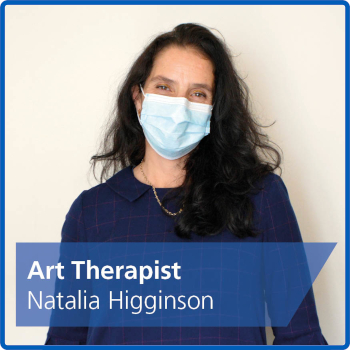
Describe your role
I am the Lead Art Psychotherapist within AWP Bristol Mental Health Community Psychiatric Services. Within Secondary Mental Health Community Services, the art psychotherapists are part of the Complex Psychological Therapy Interventions (CPI) team.
Arts Psychotherapy consists of Art Psychotherapy Music Psychotherapy, Dance Movement Psychotherapy and Drama Psychotherapy.
I manage the Art Psychotherapists within the CPI team. I am engaged in developing the modality of Arts Psychotherapy within the CPI service and AWP. I am also part of the multi disciplinary nursing team offering support, clinical supervision, training and psychological consultation.
I continue to hold a clinical caseload with particular interest in working with clients that present with complex trauma resulting in dissociation.
Why or how did you get into your role?
Initially from a background in fine art, I began to work as an art group facilitator establishing art groups for hard to reach individuals within the community of Bristol. Over 11 years I worked in partnership with organizations that offered a service to people from diverse cultural and economic backgrounds. I also worked as an Occupational Therapy Technician within a psychiatric day hospital for many years before decided to train as an Art Psychotherapist.
I qualified in an MA in Art Psychotherapy in 2005 and since then have worked within NHS adult psychiatry services in different settings.
How has the pandemic impacted on you or your role?
My role has changed substantially in managing our service to continue to operate throughout COVID-19. We moved quickly to working within a rota of being on site or working from home. We have adapted much of our work to online and over the phone services to enable us to continue to offer clinical supervision, consultation and therapy. I am inspired within this ever-changing environment, by the adaptability, resilience and creativity that staff have bought to their roles.
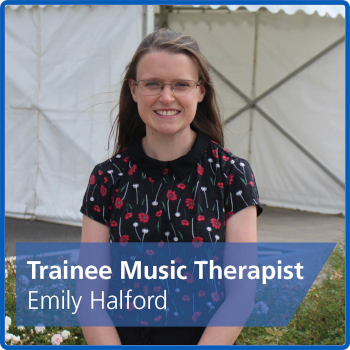
Describe your role
I am a trainee music therapist from the University of the West of England, completing my third year placement at Southmead Hospital. I shall be working with neuropsychiatric patients offering individual and group music therapy. As a trainee music therapist, I facilitate a safe space for patients to freely improvise using the musical instruments. The musical sound created provides an alternative medium to words for exploring experiences and feelings and therefore is an effective alternative treatment to counselling and psychotherapy.
Why or how did you get into your role?
I studied Music at university and during this degree I was particularly drawn to two modules – Music and the Brain and Music Therapy. I was inspired to learn that music, which had been a huge part of my life, could have such a positive effect on one’s emotional and physical health. I always knew that in the future I wanted to work with people. This therefore felt like the right pathway forward for me, combining my love for music and my passion to help people. I have currently worked in an autism specialist school, with a charity providing music therapy for adults with mental health difficulties and with an aphasia choir supporting stroke patients.
How has the pandemic impacted on you or your role?
My second year placement ended early in April at the start of the pandemic. During this time, I have attended a course focusing on providing music therapy online for patients and how to facilitate this effectively with technology, including looking at the time lags of playing together online and how to create musical instruments out of household objects for the patients to use.
I am now beginning in-person music therapy, which has required some thought about how to work safely following the COVID guidelines, including using musical instruments that are able to be cleaned easily.
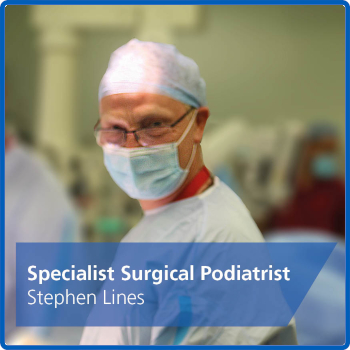
Describe your role
I have been a permanent member of the Foot and Ankle team for 20 years. I primarily work with 2 Foot and Ankle orthopaedic consultants Ian Winson and Steve Hepple. Part of my role involves teaching both junior and senior trainees in clinics and in theatre. I take part in multi-disciplinary team meetings and consultant monthly meetings.
Why or how did you get into your role?
I trained as a Podiatrist in the late 1980s. I was always interested in the surgical side of podiatry, but at the time podiatric surgery was in its infancy. A path later became available to branch from Podiatry into podiatric surgery through the College of Podiatry via basic post qualification exams. I then had to find surgical training but was fortunate to be in Bristol where Ian Winson was. He agreed to train me, but it took 6 years to get political agreement that my training in AOC was appropriate to satisfy College of Podiatry that I could operate. Since then I have been a full time Surgical Podiatrist.
How has the pandemic impacted on you or your role?
When the pandemic first hit us, I spent 2 weeks working in minor injuries which moved from the Emergency Department to Orthopaedic outpatients. In this role I was assessing and triaging patients who came in.
I was also prepared for redeployment to the wards as a general assistant to a ward consultant, in order to manage the expected influx of COVID patients. I was trained to take blood and insert cannulas, but (fortunately) the COVID situation did not deteriorate to the extend we expected so this never (as of yet) was required.
It has been a lot of work to manage the Foot and Ankle workload, reviewing all outpatients and patients on the waiting list to complete treatment programmes they have already started.
The pandemic has also meant that our face to face clinic appointments and operating lists have been reduced, with an increase in telephone appointments (except for new patients).
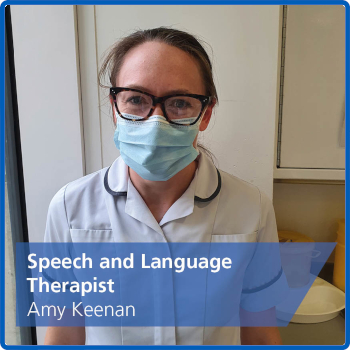
Describe your role
I am a Speech and Language Therapist. I currently work on the general medical wards including respiratory, elderly care and acute assessment wards. My primary role is assessing and providing advice for people with swallowing and communication difficulties.
Why or how did you get into your role?
I have worked at North Bristol Trust since last November. Throughout my career I have enjoyed working in a hospital setting. I love being part of the team helping people recover and supporting them to communicate effectively or eat and drink as comfortably and safely as possible.
How has the pandemic impacted on you or your role?
COVID-19 has had a significant impact on how we work. A large proportion of the people we work with have difficulties with communicating due to aphasia (difficulty understanding or saying words), cognitive changes or hearing impairment. When they cannot see our facial expressions or read our lips due to the mask and visor we wear, it makes it much harder for them to understand us and limits what we can do to help them to understand. For example in our assessments we include observation of how the muscles in the lips and tongue are moving by watching movements like sticking out the tongue, but if the person cannot do what we ask we can’t show them as our mouth is covered. We are hoping to be able to start using clear masks soon which will make life slightly easier for our patients.
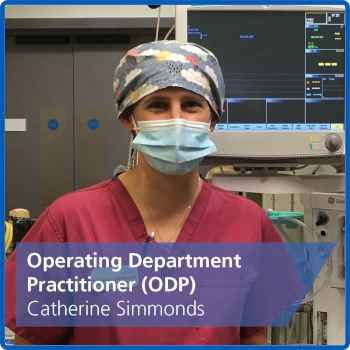
Describe your role
Operating Department Practitioners (ODPs) support patients of all ages during each phase of the patient’s perioperative care:
- Anaesthetic – provide patient-centred care and prepare specialist equipment and drugs
- Surgical – prepare all the necessary equipment and instruments for operations and providing these to the surgical team during the operation
- Recovery – supporting the patient throughout their time in the recovery ward, assessing vitals and fitness for return to the ward
Why or how did you get into your role?
I was working as a healthcare assistant in theatre and met an ODP – when he told me what he did, I knew it was the job for me! From my very first day in theatres I knew this was where I wanted to work. The environment, the team, the work, I loved everything about it!
How has the pandemic impacted on you or your role?
We've had to adapt nearly everything we do due to COVID-19, as airway procedures are about as high risk as you can get in the current climate. Cancelling elective surgeries to free up staff and beds, implementing new protocols and wearing extra protective equipment has become part of everyday life. Staff having to go off shielding have felt guilty about leaving their colleagues during such a critical time and those still at work have had to cope with being redeployed to unfamiliar areas, but as ever, the teams have pulled together and been amazing.
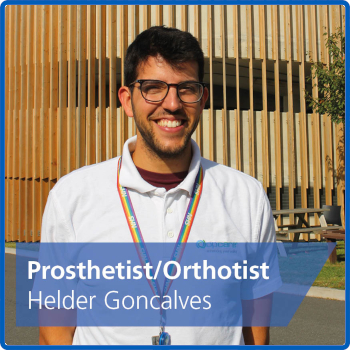
Describe your role
As Prosthetists our role is to provide artificial replacements for patients that are missing a limb or were born with congenital deformities where the limbs were not fully developed and require the aid of a prosthetic device in order to function as best as they can.
The job role of an Orthotist is to provide a range of aids to correct/support problems or deformities in peoples muscles, bones or nerves through devices like splints, braces, insoles, footwear etc.
What do you enjoy about your role?
What I like most about this role is being able to impact the quality of life of every patient in a significant way, and help them to live their best live without the limitations of their conditions.
How has the pandemic impacted on you or your role?
Since the pandemic started we have tried to provide the best service we could while being safe. New measures were put in place such as virtual calls, phone calls and screening methods to prioritize the most urgent patients so that they could be the first ones to be seen as soon as our centre was able to re-open for patient care.
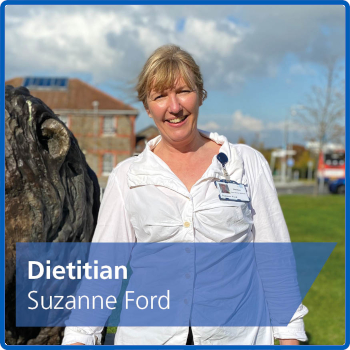
Describe your role
I work with adults who have inherited metabolic disorders (IMD).
Patients with IMDs have genetic conditions which may be diagnosed as infants, for instance through newborn screening or may be discovered much later during illness, surgery or childbirth. The disorders relate to faulty enzymes in biochemical pathways and can cause serious illness such as metabolic stroke, or death through metabolic brain injury due to the build up of toxic metabolites.
As a dietitian I collaborate with patients to support them following highly complex and restrictive diets which consist of many artificial components. For instance, I work with patients who have ulltra-low fat diets due to impaired fat oxidation, people with urea cycle disorders who need to limit protein to minimise ammonia production, adults who have phenylketonuria who have protein intakes of around 10g protein a day (a piece of bread is 4-5g protein) to avoid white matter changes in the brain.
A key part of my role is supporting women with IMDs to have successful pregnancies, with good outcomes for both mother and baby (when toxic metabolites could be harmful, or even fatal to both mother and baby). I work very closely with the Consultant Chemical Pathologist and lab staff in chemical pathology and newborn screening, as well as our specialist IMD psychologist.
Why or how did you get into your role?
I was attracted to do this work having seen the job satisfaction of the previous postholder – the work is vital and appreciated, challenging and rewarding in equal measure.
How has the pandemic impacted on you or your role?
Service continuity: I am building up my e-communications with patients by starting a newsletter to them. I have a close relationship many of my patients, eg with pregnant patients and this involves emailing and telephone. New ways of working now involve video appointments instead of face to face – I have found that we are all adapting!
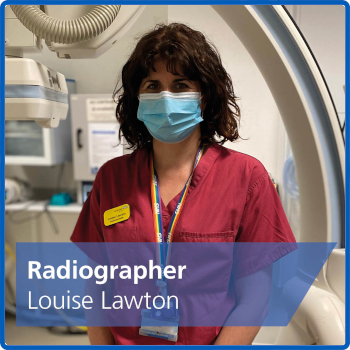
Describe your role
I’m a diagnostic radiographer working in Interventional Radiology. We work as part of a team which includes Interventional Radiologists, nurses, Vascular Surgeons, Cardiologists, HCAs and APs. We assist in the imaging of therapeutic procedures in neuro, vascular, cardiology and urology to name a few. I enjoy it as it’s great to work as part of a team every day and it’s quite unpredictable!
Why or how did you get into your role?
I thought I wanted to work within the healthcare sector and so did work experience with my cousin who was a diagnostic radiographer. From there I’ve gained experience in plain film radiography, CT and now interventional radiology.
How has the pandemic impacted on you or your role?
This year has seen us change how we work in our area greatly. We had to think a lot about the pathway of our patients and the management of our workflow. We also had to consider our working patterns, and our numbers of staff which were in at any one time. Initially there was a lot of adaptation and it meant we as a group had to be quite flexible. But it made us come together as a team, we supported each other and looked out for each other.
